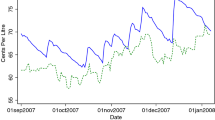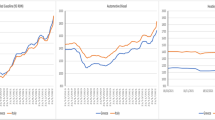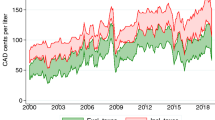Abstract
In this paper, we study fraud and price regulation in gasoline retailing: We model the incentives that retail stations have to dispense less gasoline than the amount that consumers pay for: both under fixed and flexible price regimes. The results of the model indicate that competition, cheating fines, and law enforcement efforts reduce incentives to cheat regardless of the price regime. Interestingly, price-cap regulation itself creates additional incentives to cheat and reduces welfare. Nevertheless, its effect on consumers’ surplus is ambiguous.
Similar content being viewed by others
Notes
According to the statistics in National Petroleum News, there were 13,657 public retail gasoline stations in Texas in 2008. If these 2,000 pumps were uniformly distributed across all stations, we would expect to find a cheating pump approximately in one out of seven gas stations.
Nelson (1970) distinguishes between search and experience goods in the context of quality. In the first case, consumers at some cost can determine quality prior to purchasing the good. In the second case, consumers discover quality after purchasing and using the good.
There is an accepted range of error that varies by country: For example, Aguilar (2006) explains that the allowed tolerance in Mexico is 100 ml per 20 L. This represents a 0.5% shortage. Allowed shortages are 0.5% in Spain (Gonzalez, 1998), 0.6% in Paraguay (INTN cuenta con dos técnicos, 2018), and 1% in Ukraine (Smitters, 2020).
This task could be left to the market: Specialist information firms could certify that retail stations do not cheat. Nevertheless, as was pointed out by Dranove and Jin (2010), one of the main problems with this approach is the potential conflict of interest in certifiers.
In Mexico, fines are between 12,000 and 56,000 US dollars according to Ley Federal sobre Metrología y Normalización (Article 112-A).
A barrel of gasoline is about 159 L.
Eckert (2013) explains that empirical studies of gasoline retailing often assume also that stations buy gasoline at a single wholesale price; however, they actually buy at different prices. Wholesale prices usually vary with brands and volumes (there are volume price discounts).
This assumption can be relaxed and allow firms to dispense more gas than the amount that consumers pay for.
Nelson (1970) explains that consumer recommendations are important for the purchases of experience goods.
Information about regulatory monitoring of gas stations may be accessed at https://combustibles.profeco.gob.mx.
Note that in Eqs. (12) and (14) the size of the market z and the number of firms have opposite effects. Therefore, the ratio \({\raise0.5ex\hbox{$\scriptstyle n$} \kern-0.1em/\kern-0.15em \lower0.25ex\hbox{$\scriptstyle z$}}\) would be a better measure of competition for empirical purposes than the number of firms itself.
References
6 petrol pumps shut for cheating in Narayanganj, Narsingdi. (2019). The Business Standard. Retrieved August 24, 2020, from https://tinyurl.com/y57t9r9z.
Aguilar, A. (2006). ¿Qué es una verificación? Asegurando litros de a litro. Revista Del Consumidor, 351, 16–21.
Arteaga, J. C., & Flores, D. (2010). Regulation, competition and fraud: evidence from retail gas stations in Mexico. MPRA Paper 34187. Retrieved August 18, 2019, from https://mpra.ub.uni-muenchen.de/34187/.
Becker, G. (1968). Crime and punishment: An economic approach. Journal of Political Economy, 76, 169–217. https://doi.org/10.1086/259394
Bisceglia, M., Cellini, R., & Grilli, L. (2018). Regional regulators in health care service under quality competition: A game theoretical model. Health Economics, 27, 1821–1842. https://doi.org/10.1002/hec.3805
Bommakanti, U. (2019). 7 petrol stations booked for tampering with fuel meters. Times of India. Retrieved August 24, 2020, from https://tinyurl.com/y2xcrhyd.
Brekke, K. R., Nuscheler, R., & Straume, O. R. (2006). Quality and location choices under price regulation. Journal of Economics & Management Strategy, 15, 207–227. https://doi.org/10.1111/j.1530-9134.2006.00098.x
Canlas, J. (2004). Palace, Quezon City govt go after cheating gas stations. Manila Times. Retrieved August 24, 2020, from https://tinyurl.com/y5qtw4zm.
Carranza, J. E., Clark, R., & Houde, J.-F. (2015). Price controls and market structure: Evidence from gasoline retail markets. Journal of Industrial Economics, 63, 152–198. https://doi.org/10.1111/joie.12071
Cellini, R., Siciliani, L., & Straume, O. R. (2018). A dynamic model of quality competition with endogenous prices. Journal of Economic Dynamics & Control, 94, 190–206. https://doi.org/10.1016/j.jedc.2018.06.004
Chung, H. S. (2016). Behavior-based price discrimination with experience goods. The Manchester School, 84, 675–695. https://doi.org/10.1111/manc.12140
Contín-Pilart, I., Correljé, A. F., & Palacios, M. B. (2009). Competition, regulation, and pricing behaviour in the Spanish retail gasoline market. Energy Policy, 37, 219–228. https://doi.org/10.1016/j.enpol.2008.08.018
Darby, M. R., & Karni, E. (1973). Free competition and the optimal amount of fraud. Journal of Law and Economics, 16, 67–88. https://doi.org/10.1086/466756
DNH investiga supuesto fraude en gasolineras. (2005). La Hora. Retrieved August 24, 2020, from https://tinyurl.com/y5jfcemh.
DPR seals five petrol, gas stations in Kogi for cheating. (2020). Vanguard. Retrieved August 24, 2020, from https://tinyurl.com/y6xa98pe.
Dranove, D., & Jin, G. Z. (2010). Quality disclosure and certification: Theory and practice. Journal of Economic Literature, 48, 935–963. https://doi.org/10.1257/jel.48.4.935
Eckert, A. (2013). Empirical studies of gasoline retailing: A guide to the literature. Journal of Economic Surveys, 27, 140–166. https://doi.org/10.1111/j.1467-6419.2011.00698.x
En Brasil detectan fraude en estación de gasolina en Río de Janeiro. (2019). Petroguia. Retrieved August 24, 2020, from https://tinyurl.com/y23f3ptr.
Fraud at gas stations uncovered. (2016). Arab News. Retrieved August 24, 2020, from https://tinyurl.com/y5yyz924.
Frauds and tax evasion discovered at Gas stations from Moldova. (2017). Publika. Retrieved August 24, 2020, from https://tinyurl.com/y3fas3gt.
Gonzalez, M. (1998). Tres de cada 10 gasolineras de la Comunidad de Madrid engañan a sus clientes, según un estudio de la OCU. El País. Retrieved August 24, 2020, from https://tinyurl.com/y4g4algy.
Guerrero, S. (2012). Who is selling you chiquilitros of gasoline? Evidence from a public disclosure policy. Banco de México working papers, No. 2012–04. Retrieved August 18, 2019, from https://tinyurl.com/4tsbvxfz.
Hotelling, H. (1929). Stability in competition. The Economic Journal, 39, 41–57.
Houde, J.-F. (2012). Spatial differentiation and vertical mergers in retail markets for gasoline. American Economic Review, 102, 2147–2182. https://doi.org/10.1257/aer.102.5.2147
Huck, S., Lunser, G. K., & Tyran, J.-R. (2016). Price competition and reputation in markets for experience goods: An experimental study. Rand Journal of Economics, 47, 99–117. https://doi.org/10.1111/1756-2171.12120
Hunsewraj, T. (2005). Are you being ripped off at the petrol pump? Independent Online. Retrieved August 24, 2020, from https://tinyurl.com/y6sl8bty.
Inaccurate gas pumps shortchange Canadians. (2011). CBC News. Retrieved August 24, 2020, from https://tinyurl.com/y6kteooj.
INTN cuenta con dos técnicos para fiscalizar surtidores en todo el país. (2018). Ultima Hora. Retrieved August 24, 2020, from https://tinyurl.com/y43qfjdo.
Iyer, G., & Seetharaman, P. B. (2008). Too close to be similar: Product and price competition in retail gasoline markets. Quantitative Marketing and Economics, 6, 205–234. https://doi.org/10.1007/s11129-008-9038-8
Ji-young, S. (2015). Korean gas stations to get world’s first IT fuel security module. Korea Herald Business. Retrieved August 24, 2020, from https://tinyurl.com/y6mdwx9m.
Keteyian, A. (2008). Is your gas pump ripping you off. CBS News. Retrieved August 24, 2020, from https://tinyurl.com/y6mtewu3.
Kihm, A., Ritter, N., & Vance, C. (2016). Is the German retail gas market competitive? A spatial-temporal analysis using quantile regression. Land Economics, 92, 718–736. https://doi.org/10.3368/le.92.4.718
Liu, X., Kirwan, B., & Martens, A. (2018). Regulatory compliance, information disclosure and peer effects: Evidence from the Mexican gasoline market. Journal of Regulatory Economics, 54, 53–80. https://doi.org/10.1007/s11149-018-9362-1
Moreno, L. (2018). Suman 900 mdp multas a gasolineras en el sexenio. Milenio. Retrieved August 24, 2020, from https://tinyurl.com/y5knobj2.
Multan a estaciones de servicio que alteran la cantidad de gasolina que venden. (2019). Semana. Retrieved August 24, 2020, from https://tinyurl.com/yys2hg35.
Namur, P. (2007). El "maquinazo" y las otras estafas más frecuentes en bombas de bencinas. El Mercurio. Retrieved August 24, 2020, from https://tinyurl.com/y28lftxt.
Nelson, P. (1970). Information and consumer behavior. Journal of Political Economy, 78, 311–329. https://doi.org/10.1086/259630
Obradovits, M. (2014). Austrian-style gasoline price regulation: How it may backfire. International Journal of Industrial Organization, 32, 33–45. https://doi.org/10.1016/j.ijindorg.2013.10.009
Olle, E. (2019). As petrol prices spike, servos fined by NMI for under filling customers at the bowser. 7 News. Retrieved August 24, 2020, from https://tinyurl.com/y5ec7jye.
Pertamina cries foul on S. Jakarta fuel station for fuel tampering. (2016). The Jakarta Post. Retrieved August 24, 2020, from https://tinyurl.com/y6xh4d2u.
Pro Consumidor detecta fraude en dos estaciones de gasolina. (2011). Listin Diario. Retrieved August 24, 2020, from https://tinyurl.com/y6ywaky2.
Png, I. P. L., & Reitman, D. (1994). Service time competition. Rand Journal of Economics, 25, 619–634. https://doi.org/10.2307/2555978
PROFECO. (2005). Encuesta de percepción en el consumo de gasolina 2005: resultados nacionales. Mexico: PROFECO.
Riordan, M. (1986). Monopolistic competition with experience goods. Quarterly Journal of Economics, 101, 265–279. https://doi.org/10.2307/1891115
Rosstandart revealed underfilling of fuel at every fifth gas station in Russia. (2019). Teller Report. Retrieved August 24, 2020, from https://tinyurl.com/yxvt6sll.
Salop, S. (1979). Monopolistic competition with outside goods. Bell Journal of Economics, 10, 141–156. https://doi.org/10.2307/3003323
Shapiro, C. (1982). Consumer information, product quality, and seller reputation. Bell Journal of Economics, 13, 20–35. https://doi.org/10.2307/3003427
Smitters, J. (2020). The quality of automotive gas has improved, but a sin “underfilling”. The Gal Week. Retrieved August 24, 2020, from https://tinyurl.com/y4jullmj.
Suvankulov, F., Lau, M. C. K., & Ogucu, F. (2012). Price regulation and relative price convergence: Evidence from the retail gasoline market in Canada. Energy Policy, 40, 325–334. https://doi.org/10.1016/j.enpol.2011.10.015
White, L. J. (1972). Quality variation when prices are regulated. Bell Journal of Economics and Management Science, 3, 425–436. https://doi.org/10.2307/3003031
Yerardi, J., & Wang, Y. (2012). Think the gas pump is wrong? You may be right. Houston Chronicle. Retrieved August 24, 2020, from https://tinyurl.com/y3wb57kq.
Acknowledgements
The authors acknowledge helpful suggestions of the two anonymous referees and the editor.
Funding
The authors declare that they received no research funding to elaborate this article.
Author information
Authors and Affiliations
Corresponding author
Ethics declarations
Conflict of interest
The authors declare that they have no conflict of interest.
Additional information
Publisher's Note
Springer Nature remains neutral with regard to jurisdictional claims in published maps and institutional affiliations.
Rights and permissions
About this article
Cite this article
Arteaga, J.C., Flores, D. Price Regulation and Fraud—with Special Emphasis on Gasoline Retailing. Rev Ind Organ 60, 175–192 (2022). https://doi.org/10.1007/s11151-021-09840-z
Accepted:
Published:
Issue Date:
DOI: https://doi.org/10.1007/s11151-021-09840-z




